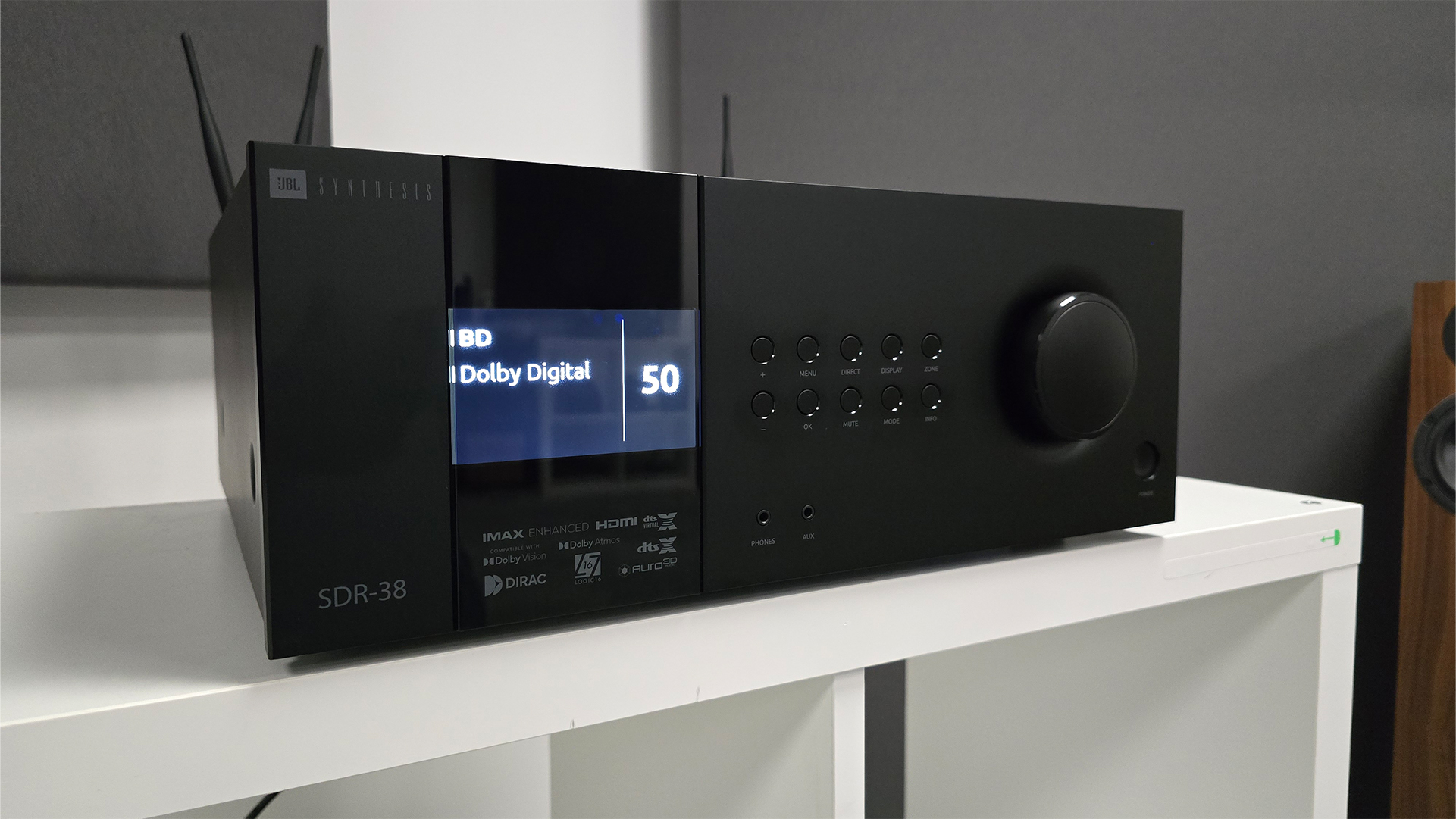I went to a Bang & Olufsen-soundtracked dinner experience – and it was deliciously strange
A stunning feast for the ears
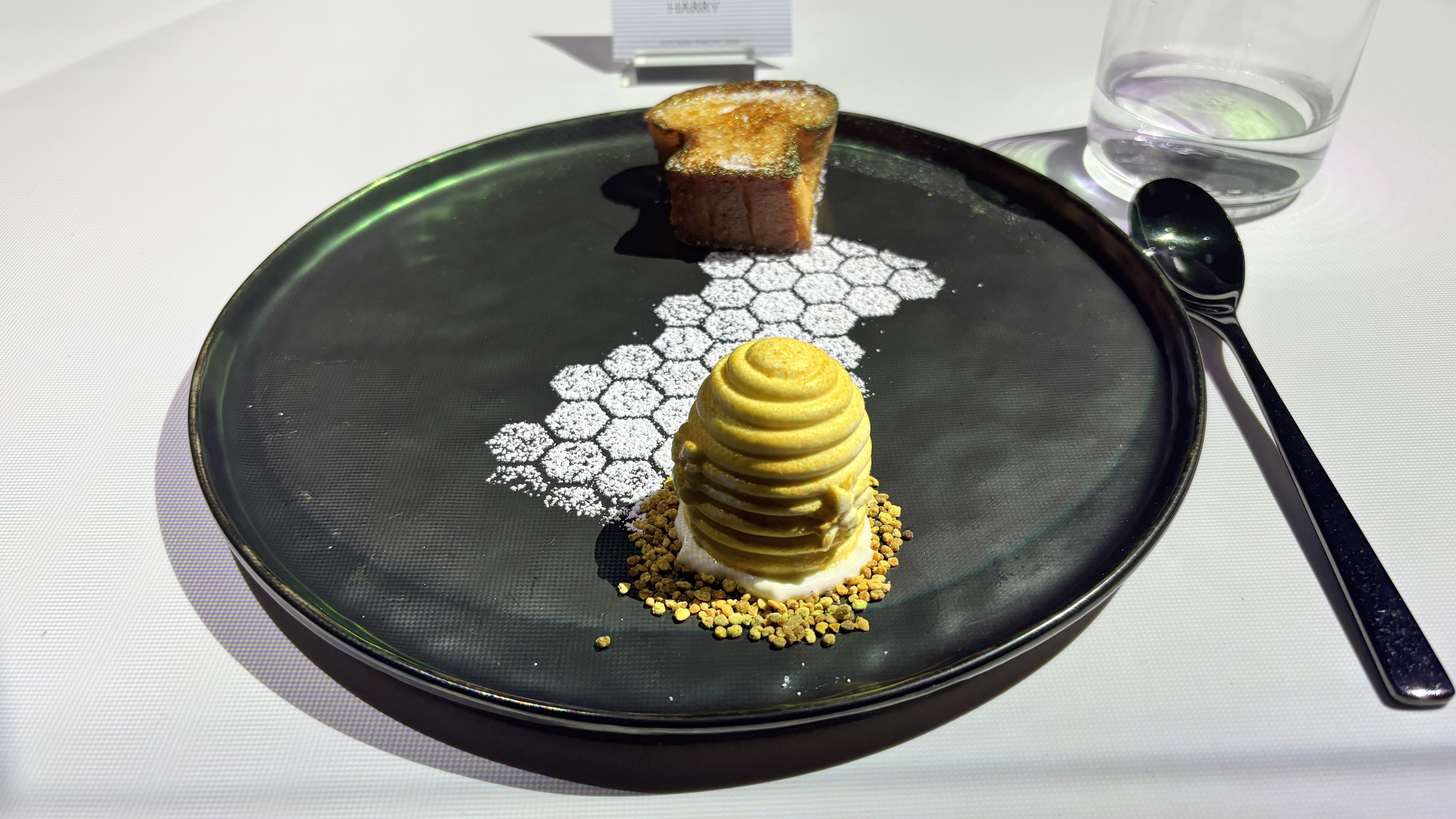
Kitchen Theory is one of those strange restaurants that doesn't look like a restaurant at all. Hidden away among the London backstreets around Holborn and Chancery Lane, it's the sort of place that, were it not for kindly staff waiting on the door to usher in hesitant journalists, could have you knocking on doors for hours before you arrived at the right spot. Most restaurants, from McDonalds to The Fat Duck, tend to make it pretty clear that within lies a place to gorge yourself on your choice of burgers or snail porridge, but Kitchen Theory is a side-door sort of establishment that uses the air of a speakeasy or underground club to add to its considerable mystique.
Perhaps the real reason behind the site's rather lacklustre signage owes to the fact that it isn't really a restaurant at all. Billed as a 'London-based design studio' providing 'Multisensory Dining Experiences', Kitchen Theory is the brainchild of chef-cum-creative director Jozef Youssef who, in collaboration with various science bods, foodies and psychologists, crafts eating experiences which go far beyond the serving of tasty grub. Behind Youssef's philosophy is the idea that we eat with our eyes, hands and ears as much as we do with our mouths, leading the charismatic culinary creative to craft the Kitchen Theory experience, an eight-course taster menu blending high-end gastronomic innovation with the sort of show and spectacle that would make P.T. Barnum jealous. Free food in the form of in-office cookies and half a Diet Coke down the local pub are usually enough to keep me from banging on the boss's door, so such a proposition had the salivary glands going into overdrive.
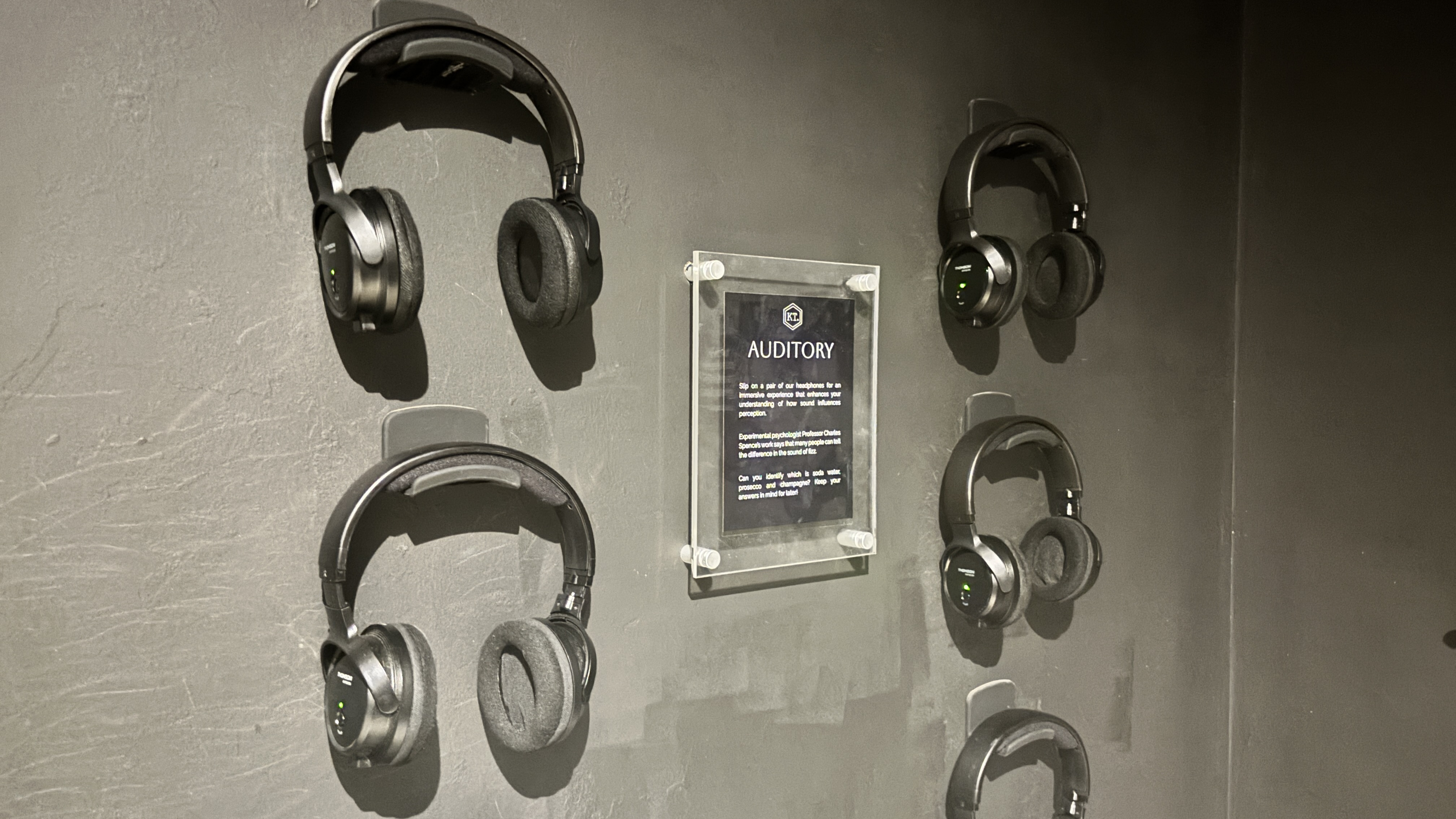
If the exterior of the Kitchen Theory experience keeps you in the metaphorical dark, the interior does so in far more literal terms. Once you've descended the stairs from a rather utilitarian foyer area, you'll soon find yourself engulfed in the smoke and steam of an enticingly dimly lit dining area populated by a large table with roughly five or six chairs on each side. Before you get yourself seated and prepare to work through several of your belt's notches, you'll be directed to wend your way around the main room via a series of small antechambers, and it's in these small rooms where the event kicks off. Incidentally, Kitchen Theory is taking bookings from the general public (north of £200 a head if you're interested), but being pampered press types, we got in early for a semi-exclusive preview.
First, you'll be primed by a small film detailing the philosophy behind the venue, before heading into another chamber in which the perceptive boundaries of your five senses will be probed. Based on the idea that stimuli other than mere flavour have a profound effect on how we experience food and drink, there are zones in which you'll play with cubes of different textures, smell scents from some rather snazzy diffusers and, of course, an array of headphones playing the sounds of different drinks being poured into various glasses. It's all a bit of fun at this stage, but the core idea is that your perception of your complimentary glass of champagne's flavour will be altered depending on, say, whether you're stroking the smooth side of your touch cube or fiddling with the fuzzy part. Smoother makes you perceive fewer bubbles from your fizz, fuzzy makes you perceive more – that's the theory, at least.
Enough preamble. It's time to get to the table, though this being Kitchen Theory, it's no ordinary slab of wood surrounded by a few IKEA cast-offs. Adorning the table's surface is an LED-studded cover, while ceiling-mounted projectors illuminate each diner's given spot. Bang & Olufsen speakers surround the diners on all sides, while a large TV screen at the far end of the room flickers like an arrivals board to signal the presentation of each new course. It's an enrapturing experience, though a small voice in the back of your mind might start to panic that you've involuntarily sucked into a scene from the Netflix series Squid Game.
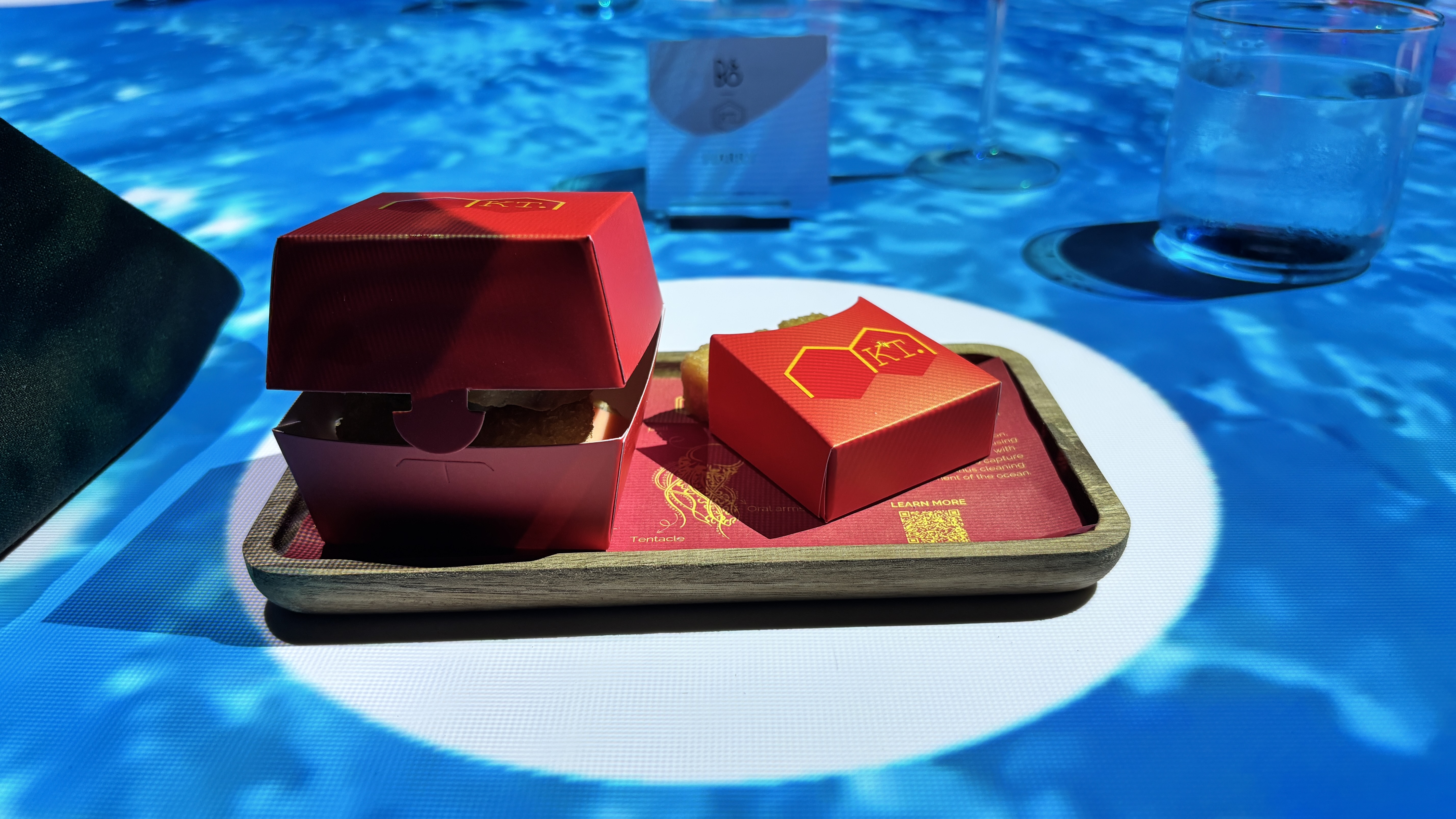
At this point, many of you will likely be asking the same question as you read this article: "Deep dives into the inner workings of the olfactory system are all well and good, but I thought I was reading What Hi-Fi?, not some random gourmet food blog." A fair point, but let me assure you that central to the courses which followed were audiovisual stimuli that took the experience far beyond the purely gastric. As every new course was introduced – chef Youssef is gifted at elucidating the culinary courses before you – the table mats and ceiling-mounted projectors would adjust the ambience according to the course's type and provenance, while B&O's speakers put in the legwork by providing an immersive sonic sound sphere to further enhance each course.
A jellyfish filet-o-fish burger was accompanied by the sound of the spraying, restless ocean, not to mention a few gulls cawing and, perhaps only in my imagination, the shouts of salty seafarers, all while the table's iridescent surface glowed a pleasing oceanic blue. An assortment of potatoes and then a tender side of Mexican venison were enhanced by the authentic sounds and sights of the Mesoamerican jungle, while an ingenious honey and vanilla ice cream dessert had some diners (or just me) swatting away imaginary bees as they flitted and buzzed overhead. It must be a nightmare of a time if you're drunk, but the effect is certainly immersive.
The latest hi-fi, home cinema and tech news, reviews, buying advice and deals, direct to your inbox.
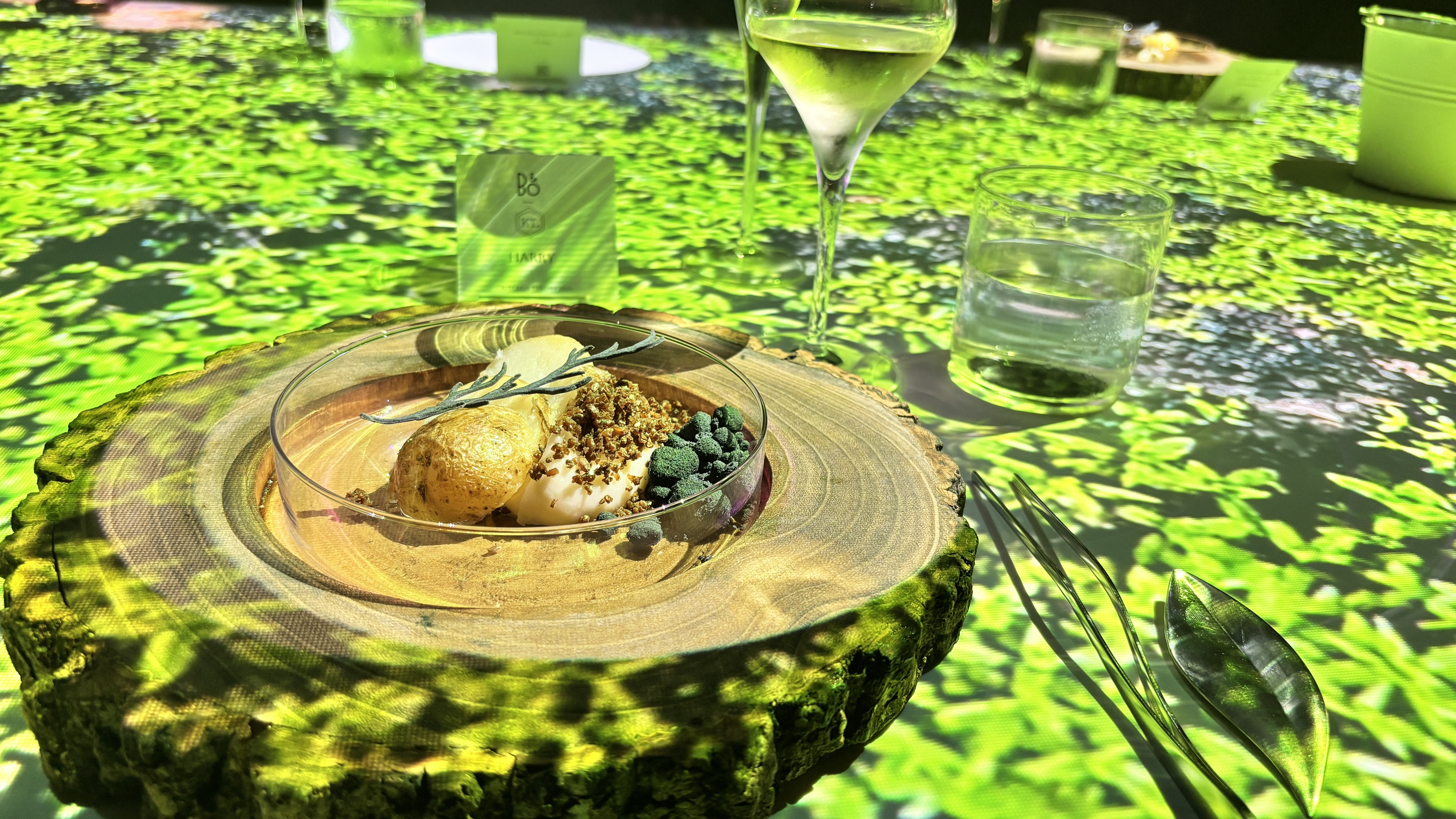
The experience can do a little too much to overwhelm the senses, all of which were presumably going into overdrive as my brain savoured the myriad flavours, bathed in the ambience of the sounds and light displays and digested, pun intended, chef Youssef's absorbing mini-pre-course lectures. When the final plate of the evening was placed in front of me and a small marshmallow ballooned in size when it came into contact with boiling hot water, I was milliseconds from greedily jamming it into my gob before realising that it was, in fact, a moist towelette. I imagine that even the best speakers in the world would likely have failed to make the taste of damp cloth more palatable.
Culinary faux pas aside, does all this pageantry really have a tangible effect on how we taste? It's hard to tell, especially given that there's no real 'control' course by which to make a meaningful comparison. Yes, the food is delicious and each course immensely satisfying, but much of that loveliness surely owes a good deal to simply how inherently tasty and well prepared the food is as opposed to the undeniably impressive light and sound show adding to the ambience. Bringing out duplicates of each dish for comparison isn't viable, but I can't imagine that tender venison or crunchy spring onions would turn to the proverbial ash in my mouth if the power suddenly went out and the experience became a good deal more analogue.
Whatever the case, Kitchen Theory is an event as much as a meal, one that's enhanced by the presence of its well-curated sound and lighting effects. Regardless of whether those extra sensory inputs are having a tangible effect on the flavours enjoyed (and who am I to tell a professional chef that they don't?), they certainly add to the experience as a whole. Fine dining is, after all, an event that goes far beyond the realm of taste, and as with so many things in life, it's a pleasure that is enhanced by the right accompanying soundtrack.
MORE:
My biggest problem with wireless earbuds would be so easy to fix – so why is it still an issue?

Harry McKerrell is a senior staff writer at What Hi-Fi?. During his time at the publication, he has written countless news stories alongside features, advice and reviews of products ranging from floorstanding speakers and music streamers to over-ear headphones, wireless earbuds and portable DACs. He has covered launches from hi-fi and consumer tech brands, and major industry events including IFA, High End Munich and, of course, the Bristol Hi-Fi Show. When not at work he can be found playing hockey, practising the piano or trying to pet strangers' dogs.
